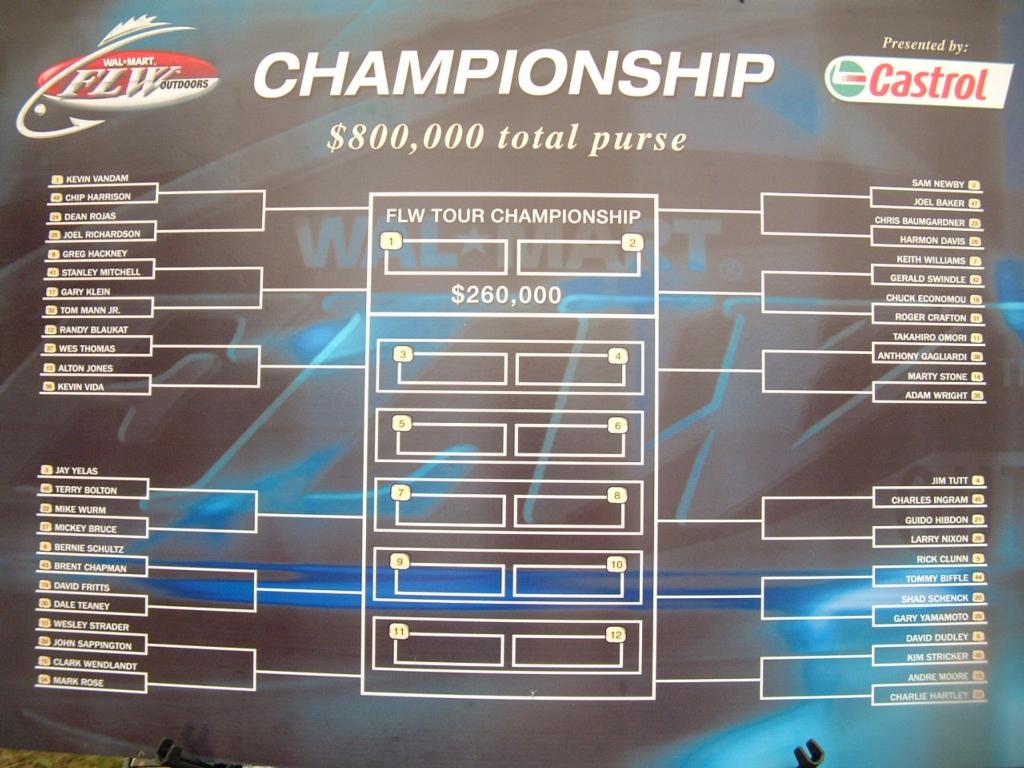2002 FLW Championship pairings an exercise in bracketology

Unique format provides plenty of intrigue, excitement for bass-fishing enthusiasts
Clark Wendlandt versus Dion Hibdon. Gary Klein versus David Fritts. Takahiro Omori versus Randy Blaukat. 2001 FLW Angler of the Year Kevin VanDam versus legendary Japanese angler Gary Yamamoto. Dream fishing match-ups? Think again. If the 2002 FLW season were to end today, these would be the exact pairings in the year-end $800,000 FLW Championship slated for Sept. 11-14 on Cross Lake in Shreveport, La.
Unlike previous years, the 2002 FLW Championship will employ a series of intriguing head-to-head matches, pairing up some of the nation’s best anglers in an all-out duel for the top prize of $260,000. However, while the prize money should provide enough incentive for anglers to do everything in their power to qualify for the championship, only the top 48 anglers from this year’s FLW pro and co-angler fields will receive an invitation.
Once the final fields are set, the competitive format – the first of its kind – will begin to truly take shape. While the tournament will be spread over four days, like all other FLW Tour events, the rules of competition will be decidedly different. For starters, all anglers will receive seeds ranging from 1 to 48 based on year-end FLW standings points. Once the tournament begins, the number-one ranked angler (FLW Tour rookie Sam Newby of Pocola, Okla., holds that distinction as of the Beaver Lake event) will be matched with the 48th-ranked angler (currently Alvin Shaw). The second-ranked angler (Jay Yelas) would take on the 47th-seeded angler (Adam Wright) and so on down the line.
For the first two days of competition, all anglers will compete in bracket-style head-to-head match-ups. Whoever brings the most weight to the scales in each of those head-to-head match-ups over the course of two days will advance to the semifinals. Consequently, 24 anglers in each division will be eliminated after the second day of competition.
In the Co-angler Division, the 24 anglers who survive the first two days of competition will have their weights reset to zero. After one more day of fishing, the co-angler champion will be crowned.
However, the Pro Division will follow a completely different format beginning on day three. For starters, the top 24 pros who advance to the semifinals will be re-seeded according to their combined weight totals over the first two days of competition. Hence, whoever catches the most fish over the first two days of the tournament will grab the number-one seed. That angler will be matched up against the angler who is seeded in 24th place (also based on weight totals from the first two days of competition). The second-seeded angler will be paired against the 23-ranked angler, and so on.
The 24 pro anglers surviving the opening round will then continue their bracket-style competition and compete head-to-head in an effort to eliminate 12 more anglers on day three. However, of the 12 pro anglers who are victorious in match play on the third day of competition, only 10 will advance to the final round. Pro anglers qualifying for the finals will again be re-ranked based on their combined weight totals for the first three days of competition. Eleventh- and 12th-place finishers, plus the 12 pro anglers eliminated from day-three match-play competition, will receive prize money ranging from $5,000 to $10,000.
On the final day of competition, the angler who qualifies for the finals with the most combined weight over the first three days of the tournament will receive the number-one seed. That angler, in turn, will battle the second-seeded angler for the 2002 FLW Championship title. The loser in this head-to-head match-up will ultimately take home second-place and at least $50,000 in prize money. By contrast, the third-ranked angler heading into the finals will face the fourth-ranked angler in a head-to-head match-up for third prize ($30,000), the fifth-ranked angler will battle the six-ranked angler for fifth place ($22,000), the seventh-seeded angler will compete against the eighth-ranked angler for seventh place ($17,000) and the ninth-place pro will battle the tenth-place pro for ninth-place ($13,000).
Clearly, the 2002 FLW Championship not only places a premium on catching a lot of fish over the course of four days, but it also brings to the forefront the importance of match-play competition.
Sound intriguing? Stay tuned.